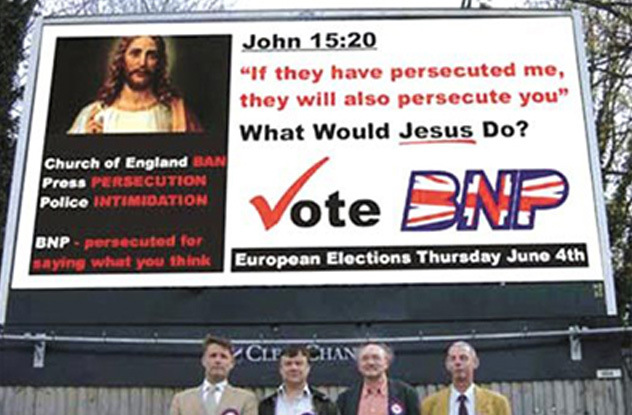
The extremist British National Party (BNP) is to launch an advertising campaign featuring Jesus Christ. The far-Right party will use the advert which features a bible verse quoting Jesus’ words about persecution, in the run up to the European Elections in June. It comes after the Church of England passed a resolution at its General Synod last month banning clergy from being members of the party.
The advert features a picture of Jesus Christ on the cross and quotes a part of a verse from John’s Gospel (John 15:20) in which Jesus says: “If they persecuted me, they will also persecute you”. The verse comes in the context of Jesus’ teaching about love. The advert then asks: “What would Jesus do?”.
In recent years the BNP has used religious rhetoric with increasing frequency. In recent local elections, the party’s literature included copies of the controversial Mohammed cartoons. It also helped establish a “Christian Council of Britain”. The goal is to appeal to those in the population who identify with Christianity, but feel panicked both by “liberal secularism” and the growth of Islam.
In an email sent yesterday to BNP supporters, BNP leader Nick Griffin said: “The British National Party is the only political party which genuinely supports Britain’s Christian heritage. It is the only party which will defend our ancient faith and nation from the threat of Islamification.”
But Jonathan Bartley, co-director of the thinktank Ekklesia said: “This is clearly a gross misrepresentation of both Jesus Christ and Christianity. Jesus was completely opposed to bigotry. He is recorded in the Gospels as challenging those who didn’t welcome foreigners – not as working for their exclusion.
“But the church must critically reflect on how it is aiding the far-Right. Leading figures within the Church of England have become far more vocal recently in their calls to ‘stem the tide of secularism’, and to defend the predominant ‘Christian culture’ of Britain. The uncomfortable fact is that this puts the Church into the position of arguing the same political point about national identity as the BNP.”
